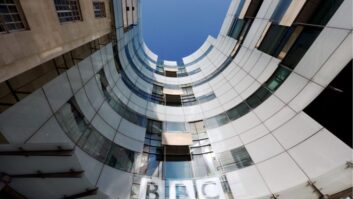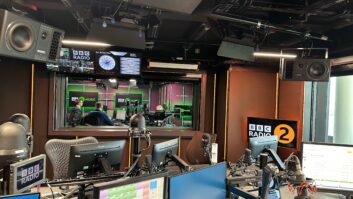What happens if the British Broadcasting Corporation stops broadcasting? According to BBC Director-General Tim Davie that question isn’t rhetorical, and instead points toward the future of one of the world’s most storied broadcasters.
“For the BBC, internet-only distribution is an opportunity to connect more deeply with our audiences and to provide them with better services and choice than broadcast allows. It provides a significant editorial opportunities. A switch off of broadcast will and should happen over time, and we should be active in planning for it,” Davie said.
Davie’s speech on Dec. 7 before the Royal Television Society came 100 years and 23 days after the BBC’s first broadcast, but it focused on the challenges and opportunities the broadcaster faces today. Since the January 2022 freeze of the TV license fee that has traditionally funded the bulk of BBC operations, Davie has made several moves to consolidate operations to put a greater emphasis on online distribution, including creating multimedia newsrooms in October 2022 as part of cuts to local radio programming.
Noting that today’s listeners and viewers are awash with choices from traditional broadcast outlets and a range of new streaming services, Davie said a change to the BBC’s traditional model is necessary.
“I sometimes read that the BBC needs to clock that the world has changed. I can assure you that we do not need convincing. The internet has stripped away the historical distribution advantage of having half of the TV channels or FM frequencies. In this world relevance, like trust, has to be earned. …,” he said. “So today is the right time to ask the question, are we happy to let the global market simply take its course or are we going to intervene to shape the U.K. market?”
In Davie’s vision, the United Kingdom and the BBC must begin work today to prepare for an internet-only future. This will involve ensuring every British household is connected via fixed-line broadband and full national 4G/5G wireless coverage. “A fully connected UK has very significant benefits for society and our economy. It would unleash huge opportunities for innovation,” he said.
With universal broadband comes more intense competition from traditional and new media from around the world, which Davie said the BBC will counter “not by creating derivative or niche content but ensuring maximum relevance of our core output” with content that “aims to appeal to all UK audiences not just monetizable groups.”
[Related: “BBC Cuts Back Local Radio in England“]
Along with this, Davie said, will come more consolidation of programming and brand identity.
“We are working on how an IP BBC could be the best version of the BBC shaped around people’s interests and needs. A daily partner to your life, bringing the BBC together in a single offer with personalized combinations. …,” he said. “Within the BBC this means significant change. We will have fewer brands overall, and consolidate more activity behind a simple, single brand in the U.K.: the BBC.”
Davie promised that more specific plans for the transformation of the BBC will be forthcoming in 2023. However, he also raised a warning that the BBC will need additional funding, noting that by 2028 core funding for the broadcaster will have been cut by 30% since 2010.
“As we look to the 2030s, we are open minded about future funding mechanics. But we are clear that it is critical that we need a universal solution that fuels U.K. public service growth not stifles it while offering audiences outstanding value for money.”
Davie also called out plans to discuss with the U.K. Foreign, Commonwealth & Development Office the immediate need for additional funding for the BBC World Service, which also saw significant cuts in service as part of a move to a “digital-led” strategy in September.
He closed his speech with a call for swift regulatory action to ensure an agile regulatory environment that can adapt to change while also guaranteeing that public-service broadcasters have access to new media platforms and technologies.







